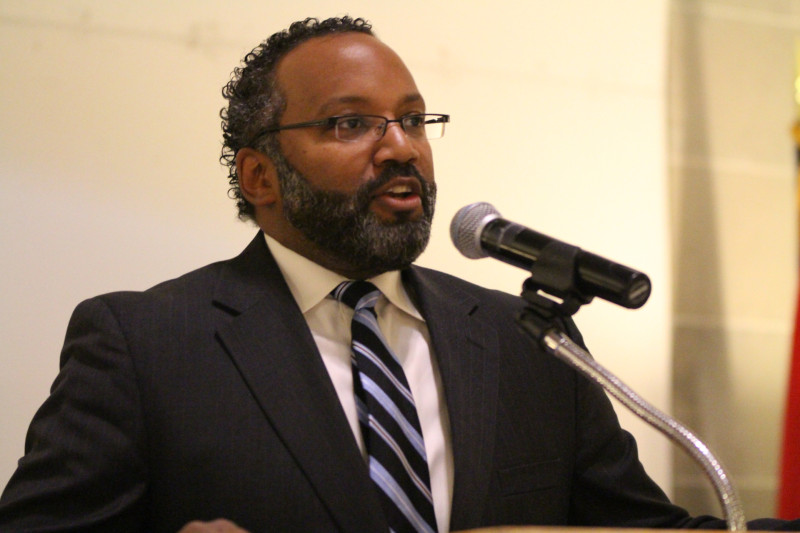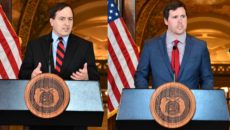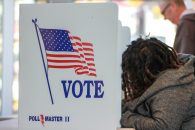JEFFERSON CITY, Mo. – When legislators overrode Gov. Jay Nixon’s veto of HB 1631, major proponents of the measure heralded its passage as an opportunity for citizens to be assured their votes will be heard at the polls.
But throughout the policy’s long lifespan in Jefferson City, photo voter ID has drawn considerable criticism from minority communities, the elderly and women’s advocacy groups as a modern day version of the poll tax. Many of those groups fear that with photo voter ID on the ballot in November, it may be the last time that some people get to exercise their right to vote.
When the legislation passed out of its first committee in January, President Rod Chapel of the Missouri NAACP testified that the legislation reminded him of Jim Crow laws that were used in the South to discriminate and disenfranchise people of color, specifically African Americans.
He still holds the same convictions against the bill now.
“We fought too long to be able to vote and I’ll be doggone if we’re just going to give it up with nobody doing anything about it,” he said in an interview Tuesday.
To combat the legislation, his organization along with other advocacy organizations across the state have joined forced to form a political action committee called the Missouri Right to Vote Coalition. Chapel says the coalition will show a sense of solidarity against the measure and even allow them to pool their resources.
“We can ensure the message we’re sending coalesces and resonates with a larger perspective,” he said.
The coalition has its own social media presence and has already produced one video detailing the difficulties of obtaining the materials needed for an ID. While the bill has provisions that cost incurred by citizens to get materials needed for a photo ID, opponents say the process is more arduous than proponents let on.
Prominent members of the coalition aside from the NAACP include Missouri Faith Voices,, the League of Women Voters, the ACLU, Empower Missouri, the AARP, Progress Missouri and many others. Currently, the group effort will function as a kind of confederation. Each will raise and contribute their own financial resources to spend on traditional and social media campaigns. Jay Hardenbrook with the AARP explains that the idea of the coalition is to coordinate their message and reach as many voters as possible.
“It’s really helpful to be able to communicate with the other groups personally to make sure we aren’t duplicating efforts,” Hardenbrook said.
As for why the AARP is getting involved, Hardenbrook says that many of 750,000 or so members of the Missouri AARP do not use their driver’s licenses anymore and don’t get them renewed. They may not keep a valid photo ID card, but they are an enormously politically active group when it comes to issues like Social Security and Medicare. Many of them, he says, also insist on voting in-person on Election Day.
“I don’t think anyone would doubt the strength of our membership or anyone over the age of 50 – their desire and ability to vote,” Hardenbrook said.
Hardenbrook and the AARP have already been hard at work sending out mailers to their members as well as working through social media. In the future, he said they would devote resources to running radio and newspaper ads and hold calls with people around the state looking for answers to questions about the Amendment.
Like Chapel, Hardenbrook says opposing Amendment 6 is a matter of protecting the right to vote.
“They’re being put in the horrible position of perjure yourself or give up their constitutional right to influence what your government looks like in the future,” he said.
Laura Swinford is the executive director of Progress Missouri, which is helping run communications operations for the coalition. Her organization has been against the amendment and she says that the reasons why the NAACP, the AARP and so many other groups oppose the ballot measure attracts a multitude of groups.
“It’s a diverse coalition because if this amendment passes, those are the kinds of people it affects. It affects everybody,” she said. “When you start toying with everybody’s voting rights, everyone is affected.”
Chapel says that’s exactly what’s at stake. He says for everyone who does not have an ID or cannot obtain one easily, their voice could go unheard and it could be a person’s last vote.
“We could be explaining to our kids or our grand kids about how this became the last time a group of Americans in Missouri got to vote,” he said.












